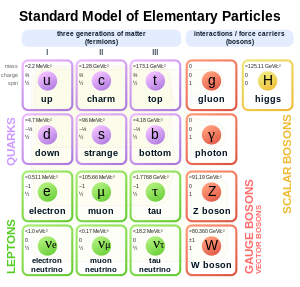What does baryon mean?
Definitions for baryon
ˈbær iˌɒnba·ry·on
This dictionary definitions page includes all the possible meanings, example usage and translations of the word baryon.
Princeton's WordNet
baryon, heavy particlenoun
any of the elementary particles having a mass equal to or greater than that of a proton and that participate in strong interactions; a hadron with a baryon number of +1
Wiktionary
baryonnoun
A heavy subatomic particle created by the binding of quarks by gluons; a hadron containing three quarks. Baryons have half-odd integral spin and are thus fermions. This category includes the common proton and neutron of the atomic nucleus.
Etymology: From βαρύς
Wikipedia
Baryon
In particle physics, a baryon is a type of composite subatomic particle which contains an odd number of valence quarks (at least 3). Baryons belong to the hadron family of particles; hadrons are composed of quarks. Baryons are also classified as fermions because they have half-integer spin. The name "baryon", introduced by Abraham Pais, comes from the Greek word for "heavy" (βαρύς, barýs), because, at the time of their naming, most known elementary particles had lower masses than the baryons. Each baryon has a corresponding antiparticle (antibaryon) where their corresponding antiquarks replace quarks. For example, a proton is made of two up quarks and one down quark; and its corresponding antiparticle, the antiproton, is made of two up antiquarks and one down antiquark. Because they are composed of quarks, baryons participate in the strong interaction, which is mediated by particles known as gluons. The most familiar baryons are protons and neutrons, both of which contain three quarks, and for this reason they are sometimes called triquarks. These particles make up most of the mass of the visible matter in the universe and compose the nucleus of every atom (Electrons, the other major component of the atom, are members of a different family of particles called leptons; leptons do not interact via the strong force). Exotic baryons containing five quarks, called pentaquarks, have also been discovered and studied. A census of the Universe's baryons indicates that 10% of them could be found inside galaxies, 50 to 60% in the circumgalactic medium, and the remaining 30 to 40% could be located in the warm–hot intergalactic medium (WHIM).
ChatGPT
baryon
A baryon is a subatomic particle made up of three quarks which are held together by the strong nuclear force. These are one of the two types of particles, the other being mesons, that are subject to the strong nuclear force. Examples of baryons include protons and neutrons, which make up the nuclei of atoms. Baryons participate in the strong interaction, whereas leptons, which are not composed of quarks, do not.
Wikidata
Baryon
A baryon is a composite subatomic particle made up of three quarks. Baryons and mesons belong to the hadron family, which are the quark-based particles. The name "baryon" comes from the Greek word for "heavy", because, at the time of their naming, most known elementary particles had lower masses than the baryons. As quark-based particles, baryons participate in the strong interaction, whereas leptons, which are not quark-based, do not. The most familiar baryons are the protons and neutrons that make up most of the mass of the visible matter in the universe. Electrons are leptons. Each baryon has a corresponding antiparticle where quarks are replaced by their corresponding antiquarks. For example, a proton is made of two up quarks and one down quark; and its corresponding antiparticle, the antiproton, is made of two up antiquarks and one down antiquark. Until recently, it was believed that some experiments showed the existence of pentaquarks — "exotic" baryons made of four quarks and one antiquark. The particle physics community as a whole did not view their existence as likely in 2006, and in 2008, considered evidence to be overwhelmingly against the existence of the reported pentaquarks.
Anagrams for baryon »
barony
Brayon
Numerology
Chaldean Numerology
The numerical value of baryon in Chaldean Numerology is: 9
Pythagorean Numerology
The numerical value of baryon in Pythagorean Numerology is: 3
Popularity rank by frequency of use
Translations for baryon
From our Multilingual Translation Dictionary
- barióCatalan, Valencian
- BaryonGerman
- bariónSpanish
- baryoniFinnish
- baryonFrench
- बेरिऑनHindi
- բարիոնArmenian
- baryonIndonesian
- þungeindIcelandic
- barioneItalian
- バリオン, 重粒子Japanese
- ភារាណូKhmer
- baryonNorwegian
- baryonDutch
- baryonNorwegian Nynorsk
- barionPolish
- bárion, bariãoPortuguese
- барионRussian
- baryonSwedish
- బారియన్Telugu
- baryonTurkish
Get even more translations for baryon »
Translation
Find a translation for the baryon definition in other languages:
Select another language:
- - Select -
- 简体中文 (Chinese - Simplified)
- 繁體中文 (Chinese - Traditional)
- Español (Spanish)
- Esperanto (Esperanto)
- 日本語 (Japanese)
- Português (Portuguese)
- Deutsch (German)
- العربية (Arabic)
- Français (French)
- Русский (Russian)
- ಕನ್ನಡ (Kannada)
- 한국어 (Korean)
- עברית (Hebrew)
- Gaeilge (Irish)
- Українська (Ukrainian)
- اردو (Urdu)
- Magyar (Hungarian)
- मानक हिन्दी (Hindi)
- Indonesia (Indonesian)
- Italiano (Italian)
- தமிழ் (Tamil)
- Türkçe (Turkish)
- తెలుగు (Telugu)
- ภาษาไทย (Thai)
- Tiếng Việt (Vietnamese)
- Čeština (Czech)
- Polski (Polish)
- Bahasa Indonesia (Indonesian)
- Românește (Romanian)
- Nederlands (Dutch)
- Ελληνικά (Greek)
- Latinum (Latin)
- Svenska (Swedish)
- Dansk (Danish)
- Suomi (Finnish)
- فارسی (Persian)
- ייִדיש (Yiddish)
- հայերեն (Armenian)
- Norsk (Norwegian)
- English (English)
Word of the Day
Would you like us to send you a FREE new word definition delivered to your inbox daily?
Citation
Use the citation below to add this definition to your bibliography:
Style:MLAChicagoAPA
"baryon." Definitions.net. STANDS4 LLC, 2024. Web. 18 Apr. 2024. <https://www.definitions.net/definition/baryon>.



Discuss these baryon definitions with the community:
Report Comment
We're doing our best to make sure our content is useful, accurate and safe.
If by any chance you spot an inappropriate comment while navigating through our website please use this form to let us know, and we'll take care of it shortly.
Attachment
You need to be logged in to favorite.
Log In